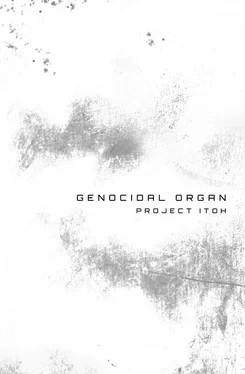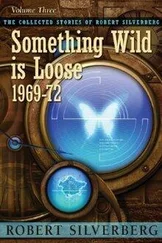Project Itoh - Genocidal Organ
Здесь есть возможность читать онлайн «Project Itoh - Genocidal Organ» весь текст электронной книги совершенно бесплатно (целиком полную версию без сокращений). В некоторых случаях можно слушать аудио, скачать через торрент в формате fb2 и присутствует краткое содержание. Год выпуска: 2012, ISBN: 2012, Издательство: Haikasoru/VIZ Media, Жанр: Старинная литература, на английском языке. Описание произведения, (предисловие) а так же отзывы посетителей доступны на портале библиотеки ЛибКат.
- Название:Genocidal Organ
- Автор:
- Издательство:Haikasoru/VIZ Media
- Жанр:
- Год:2012
- ISBN:9781421550886
- Рейтинг книги:4 / 5. Голосов: 1
-
Избранное:Добавить в избранное
- Отзывы:
-
Ваша оценка:
- 80
- 1
- 2
- 3
- 4
- 5
Genocidal Organ: краткое содержание, описание и аннотация
Предлагаем к чтению аннотацию, описание, краткое содержание или предисловие (зависит от того, что написал сам автор книги «Genocidal Organ»). Если вы не нашли необходимую информацию о книге — напишите в комментариях, мы постараемся отыскать её.
Genocidal Organ — читать онлайн бесплатно полную книгу (весь текст) целиком
Ниже представлен текст книги, разбитый по страницам. Система сохранения места последней прочитанной страницы, позволяет с удобством читать онлайн бесплатно книгу «Genocidal Organ», без необходимости каждый раз заново искать на чём Вы остановились. Поставьте закладку, и сможете в любой момент перейти на страницу, на которой закончили чтение.
Интервал:
Закладка:
And yet …
“So you experimented? With a Third World country?”
“Why do you think I joined a public relations firm?” John Paul said. “The perfect opportunity to embed myself in the core of a country’s propaganda machine. All I had to do was influence the national media broadcasters, sign off on the head of state’s speeches, tell the cabinet ministers what to say, and make sure that no government announcement went out without being checked by me first. It was easy. I had left MIT by then and my government funding had dried up, but I already knew everything I needed to know. And sure enough, the experiment proved successful.”
“But what about the other countries?” I said. “They didn’t give you the same level of access to influence the core of their government communications.”
“And they didn’t have to,” John Paul said. “A little judicious application of SNDGA and it was easy enough to work out which branches of communication I needed to focus on to yield maximal returns. Not so different from you guys, right?”
“SNDGA?”
“Not your field, perhaps? SNDGA stands for Social Network Directed Graph Analysis. It’s what your bosses use to work out which target you need to kill next in order to have the biggest chance of suppressing the violence in a region.”
He’s Public Enemy Number One. The leader who is causing the massacres, fanning the flames of chaos, bringing about death and destruction to his society. That’s why he’s your target. You need to kill him for the greater good. The sort of thing I had always been told on a pre-mission briefing. Same with Williams, Alex, Leland.
Well, I suppose someone in Washington or Fort Mead must have had a way of identifying our targets.
John Paul seemed to have seen something in my momentarily blank expression because he squatted down next to me and looked straight into my eyes as if he were talking to a crawling toddler.
“Have you ever heard of Six Degrees of Kevin Bacon?” he asked me. “A party game named after an old movie star.”
Footloose was one of my guilty pleasures.
“You take two actors who’ve never been in a movie together and try and connect them in as few steps as possible,” John Paul continued. “If there’s an actor they’ve both been in a movie with, that’s one degree of separation. If the first actor has been in a movie with an actor who in turn has been in a movie with an actor who has been in a movie with the second, then that’s two degrees of separation, and so on. Virtually every actor ever known can reach Kevin Bacon within three degrees of separation. In other words, the game is about personal networks.”
“Thanks for the explanation, but I doubt there’s an American alive who hasn’t heard of the Kevin Bacon game.”
“Do excuse me. I wasn’t trying to patronize you. It’s just a useful analogy for explaining graph theory. The study of analyzing networks made up of these sorts of links. The NSA, the Center for Counterterrorism, and DARPA all poured money into the field of graph theory once it became clear that the new type of terrorist threat was decentralized and not tied down to a specific geographical location. Graph theory became a subject of interdisciplinary military research, just like my field. Graph theorists would study data intercepted at Echelon and observe the interactions between different people in different regions—how data were exchanged. It wasn’t the contents of the data as such that was important, but the flow: how information dispersed and which channels would cause it to disseminate most effectively. All this can be ascertained through network analysis.”
That made sense. I supposed that was indeed how the powers that be chose our targets.
“But how do you know all of this?” I asked.
“They let me use their research to help my own research into the grammar of genocide. The lines that connected one point to another. The nodes and edges. Digraphs that incorporated directional markers showing the trends of information flow. Add a little bit of SNDGA, and it’s easy to work out where the most important sources of communication are. You don’t always need access to a president or a general. In fact, in one country I chose to play the role of a priest, and in another I was part of an influential NGO. More chance to propagate the genocidal grammar that way—a more extensive network, you see? Of course, the specifics vary from country to country.”
This man was calmly describing the results of a series of experiments to me as if they were entirely theoretical. It was as if he had conveniently forgotten that his research into genocide was built on top of a mountain of human misery.
“I don’t believe it,” I said. “I don’t believe that language has the ability to influence our subconscious in such a way. The Sapir-Whorf hypothesis has already been comprehensively discredited. Human thought isn’t regulated by language. Are you seriously trying to say that this weird function has been left in our brains as a result of evolution? Impossible!”
For some reason this made John Paul laugh out loud. It wasn’t a villain’s laugh, but a healthy, hearty, normal laugh. And that made it all the more freakish.
“What’s so funny?” I asked.
“Nothing, nothing. I just never expected to come across a spy who was so up to date on linguistic theory, that’s all.”
I sneered at him. “Spending time with the lovely Ms. Lucia has been very educational.”
“Yes, it seems the two of you have been spending a fair bit of time together,” John Paul said. His voice was that of supreme indifference. Damn. I’d hoped that would have affected him at least a little bit. But it seemed there was nothing I could do or say that would have any effect on this man.
John Paul started speaking again. “Do you ever think to yourself that perhaps words have no meaning?”
I said nothing. I had no idea where he was trying to go with this.
“I wonder who it was who first said that they liked something,” John Paul continued. “Or that they didn’t like something. Such simple expressions. Compare those with the conversation that the two of us are having now. Aren’t we basically saying the same thing, just in a much more long-winded and circumlocutory way? We’re basically just expressing primitive emotions, no different from saying that something tastes good or that we feel bad.”
I squirmed in embarrassment as I thought of the long conversation I had had with Lucia about my mother’s death, when I poured my heart out to her. Maybe John Paul was right. Was that not just a roundabout way of telling her that I liked her?
“Whenever I’ve studied a country undergoing a period of militarization, I entertained this charming little theory. It’s occurred to me that the slogans that inevitably end up being scrawled on the street corners aren’t really about the words at all. They’re more primitive than that. The slogans are just manifestations of a deep, primeval resonance. ‘Hate enemy.’ ‘Protect self.’ I like to think of them as little fragments of music in an underlying symphony of primeval urges.”
“People aren’t animals,” I said. “Human language is different from the howling of wild beasts.”
“Do you really believe that? I’m not sure that I do,” John Paul said. “Goethe himself admitted that something as simple as a military march could cause him to feel his spine tingling to attention. And it’s not just airports and cafés that have background music playing. Auschwitz had a soundtrack too. The sound of the wake-up bell in the morning, the drums to make the prisoners march. However exhausted and utterly despondent the Jewish inmates were, as soon as the drums broke out in rhythm they found their bodies moving along with the beat whether they wanted them to or not. Unlike what we see, what we hear has the capacity to touch our souls directly. Music rapes our senses. Meaning? What meaning? Pure sound can and will bypass all that noble-sounding guff.”
Читать дальшеИнтервал:
Закладка:
Похожие книги на «Genocidal Organ»
Представляем Вашему вниманию похожие книги на «Genocidal Organ» списком для выбора. Мы отобрали схожую по названию и смыслу литературу в надежде предоставить читателям больше вариантов отыскать новые, интересные, ещё непрочитанные произведения.
Обсуждение, отзывы о книге «Genocidal Organ» и просто собственные мнения читателей. Оставьте ваши комментарии, напишите, что Вы думаете о произведении, его смысле или главных героях. Укажите что конкретно понравилось, а что нет, и почему Вы так считаете.












